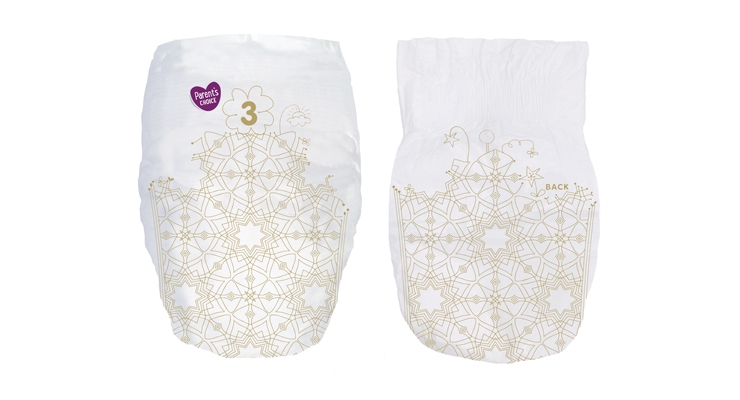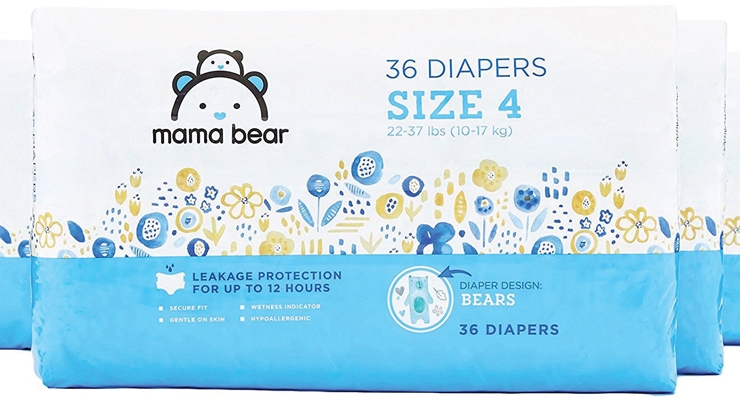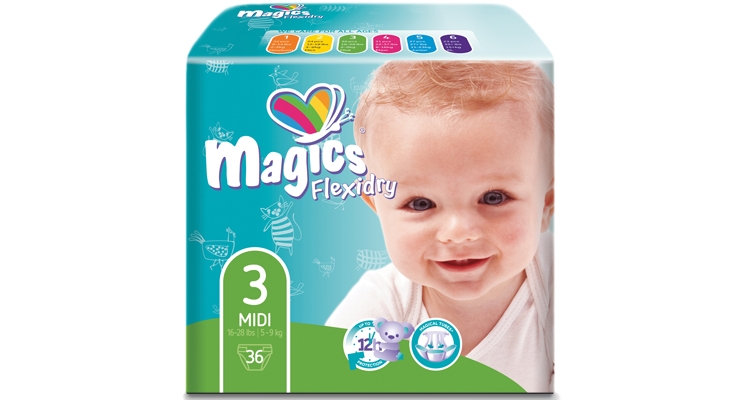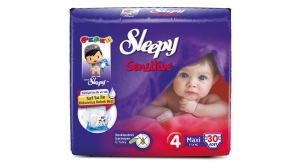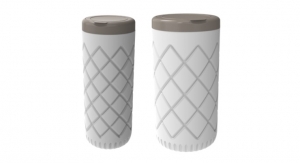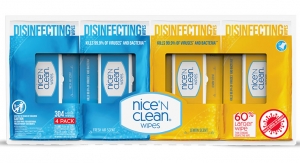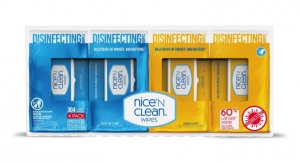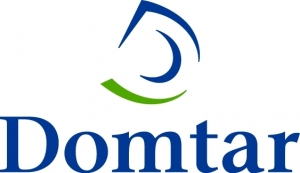Tara Olivo, Associate Editor01.05.18
In the hygiene market, private label products are no longer the “basic quality for a low price” products that they were considered in the past. Today’s store brands are more sophisticated than ever, offering the same level of quality, and in some cases even higher quality, than their branded counterparts.
“The idea that private label is a cheap alternative is gone,” says Pricie Hanna, managing partner of Price Hanna Consultants. “Today’s generation doesn’t even remember the no frills concept of private label.”
According to Svetlana Uduslivaia, head of industry research at Euromonitor International, private label products always offered good enough quality—making sure the product didn’t cause skin issues and that they held what they needed to hold—but because of pricing pressures in the market, and a narrower pricing differential due to promotional activities by branded products manufacturers, especially in baby diapers, today’s private label needs to stay ahead of the game to continue to drive and win in the marketplace.
“When it comes to what [store brands] offer—how they are positioned, how they are packaged, what they claim, they need to make sure they really support the products to compete well with branded products,” she adds.
In North America and Western Europe, private label has a good presence in all categories. According to statistics from Euromonitor, in North America, the market share of private label adult incontinence products is 25.2% and is 17.5% for baby diapers. In Western Europe, private label adult incontinence products have a 15.2% share and baby diapers have nearly a 25% market share.
While the presence in developing regions is smaller, Uduslivaia is seeing growth in certain areas such as Russia and Brazil. “There is growth in developing regions, especially in the markets that are a little bit more evolved, where you have more pronounced modern retail,” she says. “It’s a profit generating opportunity for [retailers], so they’re also getting better at the quality of what they offer. They have been looking at markets that have been hit by recessionary trends in the last couple of years, and they’re slowly recovering, but that gave private label an opportunity to essentially win that space and show consumers that it’s a better value, it’s a lower cost, but the quality is not bad. This has definitely opened up the opportunity in these markets.”
A trend Uduslivaia has seen in the private label hygiene sector is the same kind of product segmentation that’s been seen in branded products. Makers of baby diapers, femcare and adult incontinence products are offering a wider range of products. For example, in femcare private labels are coming out with products with active/sports positioning and overnight ranges. “All sorts of varieties that replicate what’s going on in branded products, and these also come with somewhat of a better price point,” she explains.
For its part, mega-retailer Walmart relaunched its own Parent’s Choice brand of baby diapers, adding a premium diaper to the line, which already offered baby diapers, training pants and overnight diapers.
After intensive research, testing and highly advanced product refinement, Walmart says its Parent’s Choice Premium Diaper offers a number of high-quality features, especially for babies with sensitive skin. The diaper’s lining is made with highly absorbent materials – including pulp harvested from sustainably managed forests – and they deliver up to 12 hours of dryness. Soft, stretchy and breathable materials, like a cotton-touch cover, are used throughout to help maintain healthy skin and keep baby comfortable. The premium diapers also feature a wetness indicator that turns blue. Walmart also added seven new baby wipes to the relaunched line, including Parent’s Choice Cotton Wipes, which are ultra-thick and made in the USA using recycled T-shirts, and other seasonal scents including White Tea & Honey and Fresh Woodlands.
Meanwhile, online giant Amazon is taking another stab at the private label baby diaper market. In November, the retailer quietly launched its own brand of diapers in sizes newborn and 1 to 6.
The diapers are offered under the new Mama Bear private label name—which is already used to sell diaper pail refills, baby food and baby laundry detergent—instead of the Amazon Elements moniker, which its baby wipes are sold under. Amazon introduced Elements private label diapers in late 2014, but removed them from the market in just a few weeks due to poor consumer feedback. At the time, the company said it would make some design changes before relaunching them.
“For Amazon, it’s interesting how they’re trying to sneak it into the marketplace, this time a lot quieter than they did with the first launch, which was a big buzz everywhere,” says Euromonitor’s Uduslivaia.
She thinks there are a few reasons why Amazon decided to put the relaunch under the Mama Bear name. First, Amazon doesn’t want consumers to have the negative reminder of what happened with the previous diaper launch under the Elements brand, and its association with poor quality. Secondly, Mama Bear is also a fairly successful baby care brand for Amazon. “Consumers already have a good perception of the brand, so the chances of them trying Mama Bear diapers would be higher,” she says.
Mama Bear diapers is an invitation-only launch, meaning that only a select few of Amazon’s customers could buy the diapers. As of the printing of this issue, there were no customer reviews of the diapers, so it remains to be seen whether the company will find success with this latest reboot.
Uduslivaia says, “If they flunk again, then they are not likely to have a third chance. I don’t think that the third time around people are going to trust it because in hygiene, especially when it comes to baby diapers, if somebody has a bad experience, the chances of winning them back are very slim. In the previous launch, the main issue was they weren’t really holding everything—that’s the main reason people buy diapers. It could be low cost, but cost is not everything here.”
Instead of choosing a third party manufacturer this time around—Canadian diaper marker Irving Personal Care manufactured Elements—Huggies maker Kimberly-Clark reportedly makes Mama Bear diapers. Uduslivaia thinks this is a good move on Amazon’s part.
“Kimberly-Clark is an expert and has been in the business for such a long time. Private label is a very small part of their business, and they do have experience in it, but most importantly they are not going to ruin their good name by producing something that doesn’t work,” she says.
Innovation is Everywhere
Innovation has been key for the hygiene manufacturers behind the private label brands that are found on store shelves around the world.
Belgium-based Drylock Technologies, which invented the fluffless diaper six years ago, continues to be at the forefront of hygiene innovation. Its latest development is a diaper with a three-channel core. The technology, called Magical Tubes, offers faster acquisition and better distribution. And, as more liquid goes inside the core, the tubes pull the diaper closer to the body, curving it for a tighter fit, according to Bart Van Malderen, Drylock’s founder and CEO.
“Drylock takes the view that the development of Magical Tubes within an absorbent core for either babies or adults is actually a very specialized science that demands the development of ideas, requires the generation and ownership of intellectual property, whilst needing focused engineering and product development skills combined with extensive time being spent to listen and learn from the consumer,” he says. “Drylock now has an extensive and deep experience in the development and manufacture of a channel-based baby diaper.”
Diapers featuring Magical Tubes technology have been available in Europe since September, and the company is planning to launch versions for adult incontinence—first in adult pants, then in all-in-one adult diapers—starting in mid-2018.
“The Drylock company was created with a belief in innovation, and the ability to make a better product offering a better consumer experience that would help to grow the share of private label with our chosen partner customers – in baby care, femcare and adult incontinence care,” Van Malderen says. “We have been continuously working on our innovation platform for six years, and we now see the fruits of our labor and are very proud of the results we are now producing for our consumers and customers in all of our product categories.”
According to Van Malderen, today’s consumers expect branded level performance out of their private label purchase, and today’s products are more sophisticated than they were a decade ago.
“Since then, private label has made a big jump forward,” he says. “Consumers that are consciously using private label know that they are now the same quality as branded products. It used to be much more difficult years ago to match the brand leader’s quality, but today that’s possible. Today we can give an alternative, and that’s what more and more people expect us to do as well, and to innovate at the same time.”
Shanghai-based American Hygienic Corporation (AHC) is also showing its innovation prowess in hygiene. Claiming to be one of Asia’s largest wet wipes manufactures, AHC recently launched an entire range of tree-free and highly compostable products in collaboration with its subsidiary company Rainbow Fame Industrial limited, also based out of Shanghai.
The new line of disposable hygiene products are made using 100% bamboo pulp, and includes bamboo-based sanitary pads, liners, 100% tree-free baby diapers and 100% compostable pads.
Paul Chandrachur, head of American Hygienic Corporation’s green business, says the trend of using organic cotton, eating organic food, or using green/organic detergents have been seen recently, but nothing really has been done in promoting green disposable products. “This is truly needed especially when you consider the current environmental scenario. It’s the need of the hour to have green disposable products as they take the highest percentage of world’s landfill waste,” he stresses.
While many hygiene brands promote themselves as being eco-friendly, Chandrachur says after analyzing them, they have found that many are promoting false claims, or are not as “green” as they should be. For its part, AHC is replacing the wood pulp-based core with bamboo pulp, which means the company is not dependent on rainforests for its main source of pulp. According to Chandrachur, almost 250,000 trees are cut every year to only make pulp for diapers in the U.S. By using bamboo pulp, AHC’s product is made using one of the most sustainable resources. “Our diaper can achieve up to 93% compost ability if sent to a professional composting facility, whereas our feminine pads are 100% compostable and tree-free in nature.”
Chandrachur considers AHC’s compostable hygiene products to be truly unique in the private label space. Not only do they add value in terms of green image building, but also retailers can carry this line of green products under their own brand as part of their range of products, giving consumers a true green disposable option. He is also seeing interest from healthcare facilities for 100% compostable incontinence pads. “[These products can overcome] huge challenges for healthcare facilities, which creates tons of plastic-based disposable waste,” he adds.
Primarily a private label manufacturer, AHC’s bamboo-based products are available in Australia, the U.S., Korea, India, China, Italy, the Netherlands and the United Arab Emirates. The company also produces eco-friendly wipes and flushable wipes, along with standard wipes.
Meanwhile, Monterrey, Mexico-based private label manufacturer Lambi has developed an aromatherapy baby diaper scented with eucalyptus. Bebin Super Buenas Noches overnight diapers are designed to relax babies when they wear the diaper overnight, up to 12 hours.
“This product was designed after making some focus groups with target consumers and giving them a new innovative use experience for the product,” says Ernesto Ortegon, exports manager. “Lambi backed up this product with a special Well-Sleep Clinic in Mexico. The main purpose is to offer a sensorial experience for the final user who does not play a decision factor role in the diapering selection.”
Bebin Super Buenas Noches overnight diapers launched in Mexico in October, and Lambi is rolling the product out to Latin America markets and independent grocers in the U.S. in the coming months. Currently they are available in Caribbean markets and regional supermarkets in Mexico, according to Ortegon.
When it comes to the private label baby diaper market, Ortegon sees it growing in some markets in Mexico, especially in the hard-discount store formats, but Latin America isn’t experiencing significant growth. “In Latin American countries, competitiveness of the market leaders are usually at private label pricing, so it does not make sense for the consumers to opt for alternatives to the top of mind brands,” he says.
As Lambi continues to expand its offerings in baby diapers, the company has also made moves in the wipes market—it recently opened its own wet wipes division. According to Ortegon, Lambi has been selling wipes for over 10 years, but has been outsourcing the product, which in recent years left them behind in competitiveness, since the company’s main markets are price sensitive. “For that reason,” he adds, “Lambi decided to invest in a state of the art new production line. This has let us develop the wipes business in the sales channels we have been successful selling diapers and feminine protection items.”
Currently, Lambi is only manufacturing spunlace-based baby wipes in flow-packs. Lambi also produces feminine care pads and adult briefs. All of Lambi’s products are made in Mexico.
Expansion Across the Globe
As part of its overall growth strategy, Drylock has cemented new plans to grow its business organically. A new factory, which will produce baby care and incontinence products, is being built next to an existing facility in the Czech Republic. Operations at this facility are expected to begin in summer 2018. The company is also expanding its facilities in the U.S., which it acquired from National Presto Industries, a maker of incontinence products, one year ago. While Drylock has invested in new equipment at the Eau Claire, WI, facility, over the last 12 months, the company has decided to expand the building for future growth opportunities. Van Malderen hopes to add femcare and baby care operations there in the future. Drylock is also operating manufacturing plants in Italy and Russia.
“The idea is to further grow very strongly organically, but also with acquisitions,” he says, suggesting that some plans for acquisitions will come to fruition in the next several months. “That is the strategy of Drylock: innovation, organic growth, new customers and acquisitions,” he adds.
Another Belgian private label manufacturer has also been in expansion mode over the last year. In March, hygiene products manufacturer Ontex Group completed the acquisition of the personal hygiene business of Hypermarcas (HM personal hygiene).
Following the integration of Grupo Mabe in 2016, Ontex said the addition of HM personal hygiene supported Ontex’s strategy by extending its growth platform in the Americas to Brazil, increasing revenue from Ontex-owned brands and accessing a fast growing market.
At the time of the acquisition, HM personal hygiene was a market leader in adult incontinence and held the No. 3 position in baby care in Brazil, the fourth largest hygiene market in the world.
The company also announced the opening of a new plant in Hawassa, Ethiopia, in July. Ontex said the opening contributes to its ongoing transformation into a leading consumer goods company, is another step in its expansion strategy, and increases the availability of its products in developing markets. Ontex’s Canbebe baby diapers are now being produced at the facility for African families.
The company says it is the first international personal hygiene company to open a plant in Ethiopia, the second largest market in Africa. Ontex CEO Charles Bouaziz explained the strategy behind the new opening: “At Ontex, we strongly believe in a local market approach. Offering local brands, sourced from manufacturing plants, which are strategically located allows us to respond efficiently and flexibly to consumers and customer needs. Our new Ethiopia plant is a perfect illustration of this; it will help us to better serve the African market.”
Ontex will also be adding its first manufacturing operations in Poland. In October, the company announced it would build a new production plant in Radomsko.
The Polish plant will support the Central European business of its Mature Markets Retail Division. Adding production capacity in Central Europe fits in the company’s global ambition to widen its international presence, the company says.
With an investment that is estimated to amount to €40 million over the next years, Ontex aims to open a total site area of around 110 thousand square meters and a total industrial area of 24 thousand square meters. The company says this will allow it to optimize production processes and service its Polish and international customers and consumers better. The first production in the new facility should be by the end of 2018 and the site should be fully operational by 2020.
Bouaziz comments: “To remain competitive it is important to continue investing in productive capacity. The new facility in Radomsko will help us to fulfill our growth ambitions, create job opportunities in the region, and make sure we continue to satisfy our expanding retailer customer and consumer base in Central and Eastern Europe.”
“The idea that private label is a cheap alternative is gone,” says Pricie Hanna, managing partner of Price Hanna Consultants. “Today’s generation doesn’t even remember the no frills concept of private label.”
According to Svetlana Uduslivaia, head of industry research at Euromonitor International, private label products always offered good enough quality—making sure the product didn’t cause skin issues and that they held what they needed to hold—but because of pricing pressures in the market, and a narrower pricing differential due to promotional activities by branded products manufacturers, especially in baby diapers, today’s private label needs to stay ahead of the game to continue to drive and win in the marketplace.
“When it comes to what [store brands] offer—how they are positioned, how they are packaged, what they claim, they need to make sure they really support the products to compete well with branded products,” she adds.
In North America and Western Europe, private label has a good presence in all categories. According to statistics from Euromonitor, in North America, the market share of private label adult incontinence products is 25.2% and is 17.5% for baby diapers. In Western Europe, private label adult incontinence products have a 15.2% share and baby diapers have nearly a 25% market share.
While the presence in developing regions is smaller, Uduslivaia is seeing growth in certain areas such as Russia and Brazil. “There is growth in developing regions, especially in the markets that are a little bit more evolved, where you have more pronounced modern retail,” she says. “It’s a profit generating opportunity for [retailers], so they’re also getting better at the quality of what they offer. They have been looking at markets that have been hit by recessionary trends in the last couple of years, and they’re slowly recovering, but that gave private label an opportunity to essentially win that space and show consumers that it’s a better value, it’s a lower cost, but the quality is not bad. This has definitely opened up the opportunity in these markets.”
A trend Uduslivaia has seen in the private label hygiene sector is the same kind of product segmentation that’s been seen in branded products. Makers of baby diapers, femcare and adult incontinence products are offering a wider range of products. For example, in femcare private labels are coming out with products with active/sports positioning and overnight ranges. “All sorts of varieties that replicate what’s going on in branded products, and these also come with somewhat of a better price point,” she explains.
For its part, mega-retailer Walmart relaunched its own Parent’s Choice brand of baby diapers, adding a premium diaper to the line, which already offered baby diapers, training pants and overnight diapers.
After intensive research, testing and highly advanced product refinement, Walmart says its Parent’s Choice Premium Diaper offers a number of high-quality features, especially for babies with sensitive skin. The diaper’s lining is made with highly absorbent materials – including pulp harvested from sustainably managed forests – and they deliver up to 12 hours of dryness. Soft, stretchy and breathable materials, like a cotton-touch cover, are used throughout to help maintain healthy skin and keep baby comfortable. The premium diapers also feature a wetness indicator that turns blue. Walmart also added seven new baby wipes to the relaunched line, including Parent’s Choice Cotton Wipes, which are ultra-thick and made in the USA using recycled T-shirts, and other seasonal scents including White Tea & Honey and Fresh Woodlands.
Meanwhile, online giant Amazon is taking another stab at the private label baby diaper market. In November, the retailer quietly launched its own brand of diapers in sizes newborn and 1 to 6.
The diapers are offered under the new Mama Bear private label name—which is already used to sell diaper pail refills, baby food and baby laundry detergent—instead of the Amazon Elements moniker, which its baby wipes are sold under. Amazon introduced Elements private label diapers in late 2014, but removed them from the market in just a few weeks due to poor consumer feedback. At the time, the company said it would make some design changes before relaunching them.
“For Amazon, it’s interesting how they’re trying to sneak it into the marketplace, this time a lot quieter than they did with the first launch, which was a big buzz everywhere,” says Euromonitor’s Uduslivaia.
She thinks there are a few reasons why Amazon decided to put the relaunch under the Mama Bear name. First, Amazon doesn’t want consumers to have the negative reminder of what happened with the previous diaper launch under the Elements brand, and its association with poor quality. Secondly, Mama Bear is also a fairly successful baby care brand for Amazon. “Consumers already have a good perception of the brand, so the chances of them trying Mama Bear diapers would be higher,” she says.
Mama Bear diapers is an invitation-only launch, meaning that only a select few of Amazon’s customers could buy the diapers. As of the printing of this issue, there were no customer reviews of the diapers, so it remains to be seen whether the company will find success with this latest reboot.
Uduslivaia says, “If they flunk again, then they are not likely to have a third chance. I don’t think that the third time around people are going to trust it because in hygiene, especially when it comes to baby diapers, if somebody has a bad experience, the chances of winning them back are very slim. In the previous launch, the main issue was they weren’t really holding everything—that’s the main reason people buy diapers. It could be low cost, but cost is not everything here.”
Instead of choosing a third party manufacturer this time around—Canadian diaper marker Irving Personal Care manufactured Elements—Huggies maker Kimberly-Clark reportedly makes Mama Bear diapers. Uduslivaia thinks this is a good move on Amazon’s part.
“Kimberly-Clark is an expert and has been in the business for such a long time. Private label is a very small part of their business, and they do have experience in it, but most importantly they are not going to ruin their good name by producing something that doesn’t work,” she says.
Innovation is Everywhere
Innovation has been key for the hygiene manufacturers behind the private label brands that are found on store shelves around the world.
Belgium-based Drylock Technologies, which invented the fluffless diaper six years ago, continues to be at the forefront of hygiene innovation. Its latest development is a diaper with a three-channel core. The technology, called Magical Tubes, offers faster acquisition and better distribution. And, as more liquid goes inside the core, the tubes pull the diaper closer to the body, curving it for a tighter fit, according to Bart Van Malderen, Drylock’s founder and CEO.
“Drylock takes the view that the development of Magical Tubes within an absorbent core for either babies or adults is actually a very specialized science that demands the development of ideas, requires the generation and ownership of intellectual property, whilst needing focused engineering and product development skills combined with extensive time being spent to listen and learn from the consumer,” he says. “Drylock now has an extensive and deep experience in the development and manufacture of a channel-based baby diaper.”
Diapers featuring Magical Tubes technology have been available in Europe since September, and the company is planning to launch versions for adult incontinence—first in adult pants, then in all-in-one adult diapers—starting in mid-2018.
“The Drylock company was created with a belief in innovation, and the ability to make a better product offering a better consumer experience that would help to grow the share of private label with our chosen partner customers – in baby care, femcare and adult incontinence care,” Van Malderen says. “We have been continuously working on our innovation platform for six years, and we now see the fruits of our labor and are very proud of the results we are now producing for our consumers and customers in all of our product categories.”
According to Van Malderen, today’s consumers expect branded level performance out of their private label purchase, and today’s products are more sophisticated than they were a decade ago.
“Since then, private label has made a big jump forward,” he says. “Consumers that are consciously using private label know that they are now the same quality as branded products. It used to be much more difficult years ago to match the brand leader’s quality, but today that’s possible. Today we can give an alternative, and that’s what more and more people expect us to do as well, and to innovate at the same time.”
Shanghai-based American Hygienic Corporation (AHC) is also showing its innovation prowess in hygiene. Claiming to be one of Asia’s largest wet wipes manufactures, AHC recently launched an entire range of tree-free and highly compostable products in collaboration with its subsidiary company Rainbow Fame Industrial limited, also based out of Shanghai.
The new line of disposable hygiene products are made using 100% bamboo pulp, and includes bamboo-based sanitary pads, liners, 100% tree-free baby diapers and 100% compostable pads.
Paul Chandrachur, head of American Hygienic Corporation’s green business, says the trend of using organic cotton, eating organic food, or using green/organic detergents have been seen recently, but nothing really has been done in promoting green disposable products. “This is truly needed especially when you consider the current environmental scenario. It’s the need of the hour to have green disposable products as they take the highest percentage of world’s landfill waste,” he stresses.
While many hygiene brands promote themselves as being eco-friendly, Chandrachur says after analyzing them, they have found that many are promoting false claims, or are not as “green” as they should be. For its part, AHC is replacing the wood pulp-based core with bamboo pulp, which means the company is not dependent on rainforests for its main source of pulp. According to Chandrachur, almost 250,000 trees are cut every year to only make pulp for diapers in the U.S. By using bamboo pulp, AHC’s product is made using one of the most sustainable resources. “Our diaper can achieve up to 93% compost ability if sent to a professional composting facility, whereas our feminine pads are 100% compostable and tree-free in nature.”
Chandrachur considers AHC’s compostable hygiene products to be truly unique in the private label space. Not only do they add value in terms of green image building, but also retailers can carry this line of green products under their own brand as part of their range of products, giving consumers a true green disposable option. He is also seeing interest from healthcare facilities for 100% compostable incontinence pads. “[These products can overcome] huge challenges for healthcare facilities, which creates tons of plastic-based disposable waste,” he adds.
Primarily a private label manufacturer, AHC’s bamboo-based products are available in Australia, the U.S., Korea, India, China, Italy, the Netherlands and the United Arab Emirates. The company also produces eco-friendly wipes and flushable wipes, along with standard wipes.
Meanwhile, Monterrey, Mexico-based private label manufacturer Lambi has developed an aromatherapy baby diaper scented with eucalyptus. Bebin Super Buenas Noches overnight diapers are designed to relax babies when they wear the diaper overnight, up to 12 hours.
“This product was designed after making some focus groups with target consumers and giving them a new innovative use experience for the product,” says Ernesto Ortegon, exports manager. “Lambi backed up this product with a special Well-Sleep Clinic in Mexico. The main purpose is to offer a sensorial experience for the final user who does not play a decision factor role in the diapering selection.”
Bebin Super Buenas Noches overnight diapers launched in Mexico in October, and Lambi is rolling the product out to Latin America markets and independent grocers in the U.S. in the coming months. Currently they are available in Caribbean markets and regional supermarkets in Mexico, according to Ortegon.
When it comes to the private label baby diaper market, Ortegon sees it growing in some markets in Mexico, especially in the hard-discount store formats, but Latin America isn’t experiencing significant growth. “In Latin American countries, competitiveness of the market leaders are usually at private label pricing, so it does not make sense for the consumers to opt for alternatives to the top of mind brands,” he says.
As Lambi continues to expand its offerings in baby diapers, the company has also made moves in the wipes market—it recently opened its own wet wipes division. According to Ortegon, Lambi has been selling wipes for over 10 years, but has been outsourcing the product, which in recent years left them behind in competitiveness, since the company’s main markets are price sensitive. “For that reason,” he adds, “Lambi decided to invest in a state of the art new production line. This has let us develop the wipes business in the sales channels we have been successful selling diapers and feminine protection items.”
Currently, Lambi is only manufacturing spunlace-based baby wipes in flow-packs. Lambi also produces feminine care pads and adult briefs. All of Lambi’s products are made in Mexico.
Expansion Across the Globe
As part of its overall growth strategy, Drylock has cemented new plans to grow its business organically. A new factory, which will produce baby care and incontinence products, is being built next to an existing facility in the Czech Republic. Operations at this facility are expected to begin in summer 2018. The company is also expanding its facilities in the U.S., which it acquired from National Presto Industries, a maker of incontinence products, one year ago. While Drylock has invested in new equipment at the Eau Claire, WI, facility, over the last 12 months, the company has decided to expand the building for future growth opportunities. Van Malderen hopes to add femcare and baby care operations there in the future. Drylock is also operating manufacturing plants in Italy and Russia.
“The idea is to further grow very strongly organically, but also with acquisitions,” he says, suggesting that some plans for acquisitions will come to fruition in the next several months. “That is the strategy of Drylock: innovation, organic growth, new customers and acquisitions,” he adds.
Another Belgian private label manufacturer has also been in expansion mode over the last year. In March, hygiene products manufacturer Ontex Group completed the acquisition of the personal hygiene business of Hypermarcas (HM personal hygiene).
Following the integration of Grupo Mabe in 2016, Ontex said the addition of HM personal hygiene supported Ontex’s strategy by extending its growth platform in the Americas to Brazil, increasing revenue from Ontex-owned brands and accessing a fast growing market.
At the time of the acquisition, HM personal hygiene was a market leader in adult incontinence and held the No. 3 position in baby care in Brazil, the fourth largest hygiene market in the world.
The company also announced the opening of a new plant in Hawassa, Ethiopia, in July. Ontex said the opening contributes to its ongoing transformation into a leading consumer goods company, is another step in its expansion strategy, and increases the availability of its products in developing markets. Ontex’s Canbebe baby diapers are now being produced at the facility for African families.
The company says it is the first international personal hygiene company to open a plant in Ethiopia, the second largest market in Africa. Ontex CEO Charles Bouaziz explained the strategy behind the new opening: “At Ontex, we strongly believe in a local market approach. Offering local brands, sourced from manufacturing plants, which are strategically located allows us to respond efficiently and flexibly to consumers and customer needs. Our new Ethiopia plant is a perfect illustration of this; it will help us to better serve the African market.”
Ontex will also be adding its first manufacturing operations in Poland. In October, the company announced it would build a new production plant in Radomsko.
The Polish plant will support the Central European business of its Mature Markets Retail Division. Adding production capacity in Central Europe fits in the company’s global ambition to widen its international presence, the company says.
With an investment that is estimated to amount to €40 million over the next years, Ontex aims to open a total site area of around 110 thousand square meters and a total industrial area of 24 thousand square meters. The company says this will allow it to optimize production processes and service its Polish and international customers and consumers better. The first production in the new facility should be by the end of 2018 and the site should be fully operational by 2020.
Bouaziz comments: “To remain competitive it is important to continue investing in productive capacity. The new facility in Radomsko will help us to fulfill our growth ambitions, create job opportunities in the region, and make sure we continue to satisfy our expanding retailer customer and consumer base in Central and Eastern Europe.”

